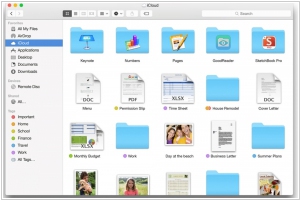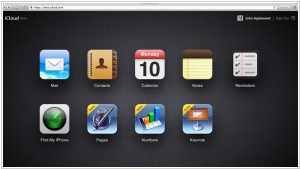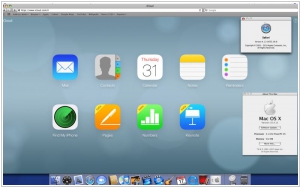iCloud is #8 in Top 10 Cloud Storages
iCloud is cloud service done right. It stores your music, photos, apps, calendars, documents, and more. And wirelessly pushes them to all your devices.
Positions in ratings
#8 in Top 10 Cloud Storages
Alternatives
The best alternatives to iCloud are: DropBox, Google Drive, OneDrive
Latest news about iCloud
2023. Apple revamps iCloud.com with more features for drive, mail and notes

Apple has introduced a revamped version of iCloud.com, enhancing its functionality for PC users. The redesigned website offers support for browser notifications for Mail and Calendar, allowing users to receive alerts directly on their PCs. Additionally, the homepage is now customizable, enabling users to take quick actions like downloading files, deleting emails, marking tasks as unread, and more. This update builds upon last year's redesign, which included quick-glance widgets for apps like Notes and Pages. Furthermore, iCloud.com now enables users to insert links from one note into another, akin to iOS 17, enhancing the overall user experience and productivity on the platform.
2014. Apple iCloud to get folders with files, Windows app

Cloud file storage and sync service iCloud is not well-received among Apple enthusiasts for several reasons. Firstly, it exclusively syncs internal app files, preventing users from accessing them outside these apps. Secondly, its pricing is considered expensive ($20 for 20GB), making it a luxury only affordable for Dropbox. Thirdly, it solely functions on Apple devices, even frustrating Apple fanatics who desire more openness. To address these concerns, Apple has introduced an update to the service, now known as iCloud Drive. This revamped version operates similarly to Dropbox, allowing synchronization of any folders with any files. Additionally, it will offer a client for Windows in addition to the existing Mac and iOS apps. Furthermore, Apple has reduced the pricing, starting from $0.99 per month for 20 GB, and a free storage tier of 5 GB will also be available. These improvements are slated to launch in the upcoming fall alongside the release of the new iOS 8 and OSX Yosemite.
2013. Apple launches iWork for iCloud

In terms of business applications, Apple has historically shown less interest, but it recognizes the significance of Office as an essential component of its platform. Competitors such as Microsoft and Google have taken significant strides in this area, surpassing Apple. To address this, Apple made a move to rectify the main drawback of its office suite, which was the absence of an online version. During the WWDC conference in June, Apple officially unveiled iWork for iCloud, making the online applications Pages, Numbers, and Keynote accessible to all through iCloud online accounts (currently in beta). However, these editors currently have limitations that may only appeal to users of MS Office and Google Docs. For instance, the text editor Pages lacks the ability to add tables, and spell check functions are only available in English. Collaboration tools are also absent. On a positive note, users can upload and edit MS Word, Excel, and PowerPoint documents, with formatting being preserved in some cases. Additionally, documents can be downloaded in MS Office formats and PDF.
2011. Apple iCloud delighted SaaS vendors

As you may be aware, on Monday, Steve Jobs once again took the stage to unveil another groundbreaking innovation. This time, however, the focus shifted from small metallic devices to something larger and virtual: iCloud - the new cornerstone of Apple's strategy. From an enterprise perspective, iCloud may not be particularly captivating. Its primary function is to synchronize content and applications across all Apple devices (iPad, iPhone, Mac), thereby enhancing personal productivity. Nevertheless, the advent of iCloud has garnered enthusiastic responses from SaaS vendors such as Box.net, Zoho, and Salesforce. These vendors appear content that iCloud does not pose direct competition, as it exclusively caters to Apple devices and lacks collaborative features. However, iCloud's significance lies in the broader shift from desktop-centric computing to the Cloud, as emphasized by Steve Jobs himself. When Jobs asserts that the center of computing is no longer confined to the iPhone or iPad but resides in the cloud, people believe it, including those in the enterprise realm.


